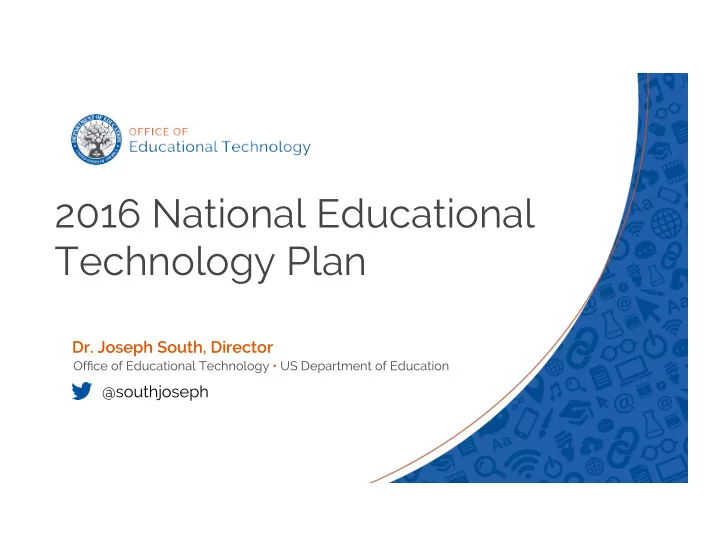

2016 National Educational Technology Plan Dr. Joseph South, Director Of fi ce of Educational Technology • US Department of Education @southjoseph @Of fi ceOfEdTech
What We Do ● In the O ffi ce of the Secretary of Education ● Work with other ED o ffi ces, the White House, and other agencies ● National Educational Technology Policy Development ● Support the President’s and Secretary’s priorities ○ Promoting equity of access, broadband connectivity for all ○ Future Ready Educators ○ Robust ecosystem of entrepreneurs and innovators and leading edge research
What is the National Educational Technology Plan?
tech.ed.gov/netp
A Vision A Call to Action A Collection of Examples
Major Sections: Learning Teaching Leadership Assessment Infrastructure
Section Structure: Goal Guiding Principles De fi nitions Examples Recommendations
Engaged Recognized Experts Conducted National Outreach Collected Real-World Examples
“The NETP focuses on using technology to transform learning experiences with the goal of providing greater equity and accessibility .”
NLTS Tracks: Technology Competencies for Teacher Educators & E ffi cacy of Educational Technologies
Technology Competencies for Teacher Educator
Revolution in Classroom Connectivity “In a country where we expect free wi- fi with our co ff ee, we should de fi nitely demand it in our schools” ~ President Obama
Professional Connectivity Learning High-Quality High-Quality, Devices & A ff ordable Digital Software Resources www.whitehouse.gov/connectED ¡ #FutureReady
e-rate: $3.9 billion
lifeline: $2.25 billion
“ Educators need to have the knowledge and skills to take full advantage of technology- rich learning environments...” “In addition, the roles of PK-12 classroom teachers…and learners all will need to shift as technology enables new types of learning experiences.”
“Develop a common set of technology competency expectations for university professors and candidates exiting teacher preparation programs for teaching in technologically enabled schools and post-secondary education institutions” (U.S. DOE, 2016, 37).
4 Goals for Teacher Prep Programs ● Focusing on the active use of technology to enable learning and teaching through creation, production, and problem solving. ● Building sustainable , program-wide systems of professional learning for higher education instructors to strengthen and continually refresh their capacity to use technological tools to enable transformative learning and teaching. ● Ensuring pre-service teachers’ experiences with educational technology are program-deep and program-wide rather than one-o ff courses separate from their methods courses. ● Aligning the above e ff orts with research-based standards, frameworks, and credentials recognized across the fi eld.
Competencies & Microcredentials
ISTE, SITE, NTLS, CAEP (Glen Bull & David Slykhuis) collaborating on competencies with Teresa Foulger
Rick West (BYU), Anne Ottenbreit-Leftwich (Indiana U), Tim Newby (Purdue), Kyle Peck (Penn State) collaborating on microcredentials
Badges are becoming: Digital, “ clickable ” representations of lifelong learning.
Endorsements ! CC-BY-SA Kyle Bowen
Badges ¡as ¡Micro-‑creden/als ¡ • Receive ¡recogni4on ¡for ¡ smaller ¡chunks ¡ of ¡learning ¡ ¡ • Easier ¡to ¡ communicate ¡skills ¡to ¡employers ¡and ¡other ¡ interested ¡par4es ¡ ¡ • Metadata ¡makes ¡data ¡open, ¡providing ¡greater ¡insights ¡ into ¡person’s ¡skills ¡(viewer ¡could ¡even ¡re-‑grade ¡the ¡ submiBed ¡project ¡if ¡they ¡wanted ¡to) ¡ • Be ¡recognized ¡ for ¡what ¡doesn’t ¡show ¡on ¡a ¡transcript ¡ • If ¡you ¡can ¡document ¡it, ¡you ¡can ¡badge ¡it! ¡ ¡ ¡ ¡ BYU ¡ Rick West and Dan Randall - BYU ¡
Micro Badges for Teacher Education
Should we host a working group? Consisting of: • Leading Educational Technology-related Professional Associations • Leading Teacher Preparation Institutions, and • Leading School Districts To: • Develop the Teacher Educator Competencies into Micro-credentials • For Teacher Educators AND K-12 Teachers • Endorsed by professional organizations by • Adding criteria and defining the evidence required • Developing rubrics with which to assess the evidence • Sharing the Micro-credentials across universities • Encouraging Districts to get serious about technology-related preparation
E ffi cacy of Educational Technologies
Rapid Cycle Evaluations for Ed Tech tech.ed.gov/rcte
Districts Rely More on Peer Recommendations and Pilots than Rigorous Evidence
Take Too Long + Too Expensive
Not Iterative
Serve Di ff erent Purposes traditional research = high con fi dence of certainty of causal connections
Rapid Cycle Evaluations for Ed Tech • Project will provide a platform and resources for districts to evaluate ed tech products • Platform will be free, publicly available, and under an open license • Designed for ed tech, but easily adapted to other research questions
RCE Work fl ow 01. 02. 03. Welcome to Understanding Planning Your RCE for Ed Tech Your Problem Research 04. 05. 06. Preparing Your Analyzing Your Summarizing Data Data Your Findings
@Of fi ceOfEdTech tech.ed.gov
Recommend
More recommend